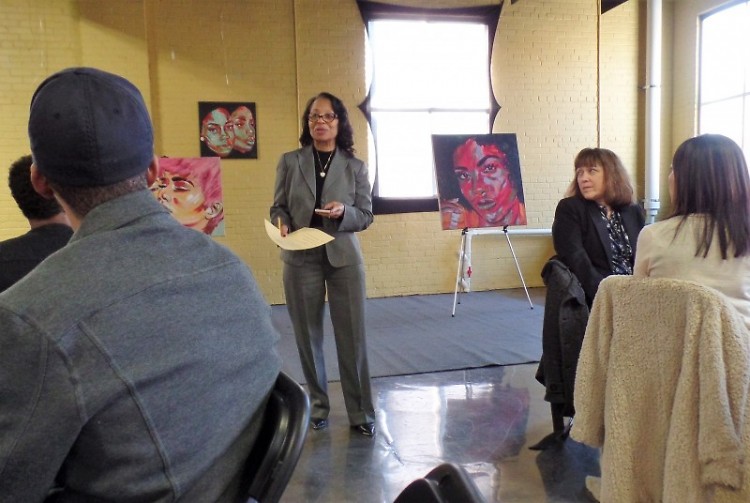The Gallery at Linc Up (Madison and Hall) hosted about 20 people on Thursday night who gathered to discuss public trust and law enforcement. The forum was conducted by Michigan Commission of Law Enforcement Standards (MCOLES).
MCOLES is the licensing body for law enforcement officers and police academies throughout the state of Michigan, explained David Harvey, Executive Director and a former law enforcement officer himself. MCOLES sets the state standards for police selection, training, recruitment, professional licensing, and revocations of license. Under order from Michigan Governor Rick Snyder, MCOLES will submit a report that addresses public trust in law enforcement across the state, with the goal of improving trust and cooperation. Toward this goal, MCOLES has hosted forums throughout Michigan in order to gather public feedback. The forum in Grand Rapids was the last of the series.
Maria Moreno-Reyes, a member of the Grand Rapids Police Civilian Appeal Board and a resident of the Grandville Avenue corridor, said she attended to educated herself. "I want to learn about law enforcement from local to the federal level, so I can share this with my community.”
Though attendance was sparse, the conversations were robust. Velicia Humes, Ed.D., acting as a consultant to MCOLES, facilitated the discussion by breaking the audience into two groups and asking them to answer the question, “What steps can be taken to strengthen public trust and confidence in the police in your community?”
"If your community is in crisis, we want to know what's happening. If it's not in crisis, we want to know what you're doing!" said Humes.
Sensitivity and respect
Participants had several ideas. Perry Collier, a resident of the Southeast side of Grand Rapids, said, “How an officer approaches a situation is very important.” Collier and others were concerned that if an officer approached a traffic stop with his hand on his weapon, that would scare the citizen. Other participants were concerned that because of cultural differences, a white officer might not recognize fear in an African-American and might confuse it with aggression or a criminal behavior. Or that racial profiling might be used to decide when to stop a person -- or a misunderstanding of behavior related to a disability or mental illness. Many agreed that cultural sensitivity, mental health training, and implicit bias training were an important piece of the puzzle.
Participants also wanted to see more day-to-day conversations between the public and law enforcement. In communities where law enforcement has not always been trusted, some participants recognized that they were showing fear of the police when in fact it was okay to approach them, talk to them, and wave hello to them in passing. Citizens suggested that hiring police officers from the communities they served and having law enforcement spend time with kids in school might help. "We need to learn more about police so we can just talk to them," said Moreno-Reyes.
Transparency and real accountability were also mentioned during the evening, with body cams and car recordings being seen as useful tools. As Humes summarized at the end of the night, people want to see officers being charged when they commit a crime, and fired when they show improper use of force or a consistent inability to show sensitivity.
'Trust me'
Finally, the participants wanted to see that their input was heard and that MCOLES and other law enforcement agencies would respond with meaningful action. Some wondered whether the forums were just “for appearances.” Though others felt that might be cynical, Harvey shared that the results and eventually the training recommendations would appear on the MCOLES website.
When asked to provide one word that described what they wanted from police, the participants answered, "Listen." "Education." And Collier responded, patting his chest, "Trust me," reminding the group that trust goes both ways.
For citizens who could not make the meeting, MCOLES will accept public comment at the survey site (linked here) until March 20. The survey is also available in Spanish and Arabic.
The Rapidian, a program of the 501(c)3 nonprofit Community Media Center, relies on the community’s support to help cover the cost of training reporters and publishing content.
We need your help.
If each of our readers and content creators who values this community platform help support its creation and maintenance, The Rapidian can continue to educate and facilitate a conversation around issues for years to come.
Please support The Rapidian and make a contribution today.
